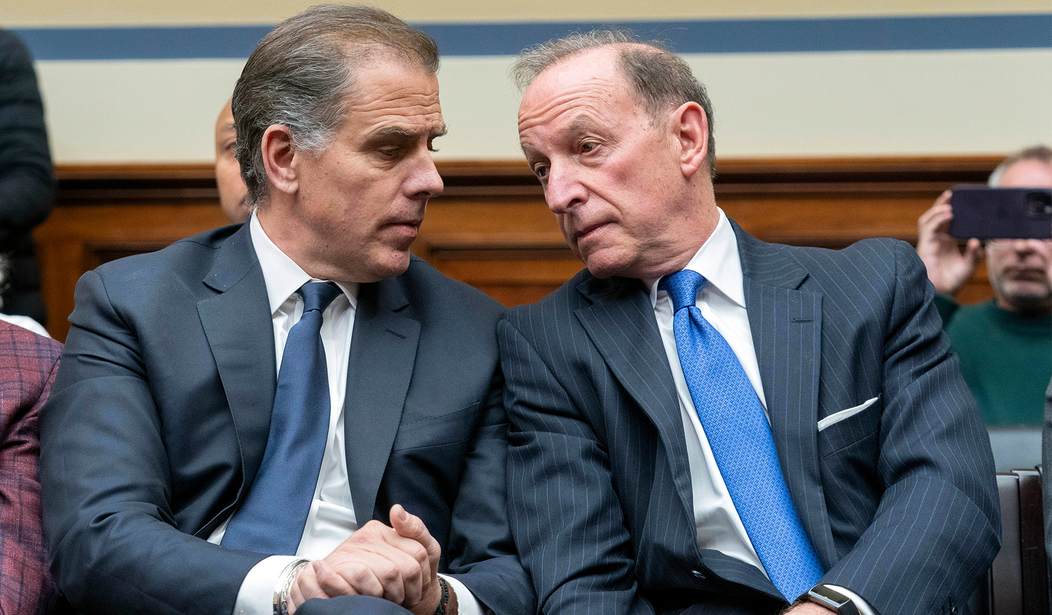The ink is barely dry on the decisions handed down by the Supreme Court the last week of June, but Hunter Biden's legal team is already availing itself of one of the rulings in an effort to have the First Son's convictions in his Delaware gun trial overturned.
On Wednesday, the high court issued its opinion in Snyder v. United States, a case involving the former mayor of Portage, Indiana, who accepted a $13,000 check from a trucking company after the city awarded two contracts to the company for the purchase of its trucks. At issue was whether the statutory section under which Snyder was charged and convicted applied to gratuities (gifts after the fact) or solely to bribes. In holding that the particular statute at issue only applied to bribes, the court wasn't absolving Snyder of shady behavior. Rather, it was saying if Congress wants that section to cover gratuities as well as bribes, it's perfectly capable of amending the law to make that clear, and the government is also free to prosecute under other statutes that prohibit accepting gratuities.
The Skinny on SCOTUS - 6-26-24 Edition: Gratuities Aren't Bribes and Standing Is Tricky
In Snyder v. US, Jackson's Dissent Is Red Meat for the Left to Chew On
The Supreme Court Firebombs the Administrative State and Tells Congress
to Get Off Its Butt and Work
On Thursday, Hunter Biden's lawyers filed a "Notice of Supplemental Authority" (see below) in the Delaware District Court where he was convicted and where Judge Maryellen Noreika is considering his motion for new trial. Their argument is essentially that a similar analysis of the statutory language under which Biden was charged raises the same issues as the Supreme Court found in Snyder.
Yesterday, the Supreme Court decided Snyder v. United States, No. 23-108 (U.S. June 26, 2024), which is pertinent to the questions of vagueness and fair notice that Mr. Biden has raised in the case before this Court. Snyder rejected the government’s argument that 18 U.S.C. § 666 extended beyond bribery to criminalize mere gratuities, in part because of the lack of “fair notice” concerning this offense and a concern it “would create traps for [the] unwary.” Slip op. at 7, 11.
...
Justice Gorsuch concurred to emphasize the lack of fair notice point, explaining “any fair reader of this statute would be left with a reasonable doubt about whether it covers the defendant’s charged conduct.” Slip op. at 1 (Gorsuch, J., concurring).
Translating the logic behind Snyder into the issues his lawyers claim are at hand in Hunter's case is where it gets somewhat fun:
Mr. Biden’s case has even more significant lack of fair notice issues. In the first place, unlike Snyder where nobody has a right to give or accept a gratuity, Mr. Biden’s conduct implicates his constitutional Second Amendment rights. Nevertheless, Mr. Biden was not given fair notice of the crimes the jury was permitted to convict him upon. When ATF Form 4473 asked in the present tense if he was a “user of controlled substances” in the present tense, he was not told as the jury was instructed that means if he last used drugs “days or weeks before.” 6/10/24 Tr. at 1305. Even under that definition, neither Mr. Biden nor anyone else would have clarity about how many days or weeks would need to pass after quitting the use of drugs before that box could be checked “no.” Foregoing his Second Amendment rights altogether by never buying a gun is no answer either, just as not giving or accepting any sort of gratuity was no answer in Snyder, which did not even involve the exercise of a constitutional right.
Those same fair notice problems persist with Section 822(g)(3)’s definition of gun possession. While that term is clear when restricted to actual physical possession, it defies fair notice when construed as to the constructive possession concepts permitted by the Court’s instructions and the Special Counsel’s arguments that mere ownership is sufficient. See 6/4/24 Tr. at 342. Someone who owns a gun in Delaware but is not in physical possession of the gun (perhaps miles away) poses no dangers of misusing a firearm. Such a construction of the terms is beyond the Second Amendment or any valid purpose for Section 922(g)(3), and it too poses fair notice problems. There was no evidence that Mr. Biden was in actual physical possession of a gun at any point that he was actually using drugs.
This has that sort of "It depends on what the definition of the word 'is' is" feel to it, but cases involving statutory construction often do. Sometimes, it comes down to the placement of a comma or the verb tense used. (And yes, this is one of several reasons people hate lawyers.) But points to Abbe Lowell and Biden's defense team for seizing upon the SCOTUS ruling and attempting to use it to their advantage. (Don't be surprised if, on Monday or Tuesday, they file an additional Notice of Supplemental Authority invoking Fischer.)
Supreme Court Hands Down Blockbuster Ruling in Case
That Will Impact Multiple J6 Defendants
Fischer v. United States – A Tale of Two Readings: All May Not Be What It Seems
Will it ultimately be successful? My instinct is that it will not. But as lackluster as their trial performance seemed to me, I will hand it to them for this semi-clever effort post-trial.
RHB - De - Supplemental Authority - 6-27-24 by Susie Moore on Scribd















Join the conversation as a VIP Member